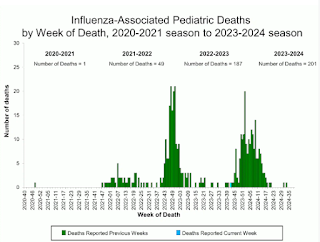
#18,409
Pediatric Flu Deaths Reach 200 for the 2023-24 Flu Season
September 27, 2024 – CDC reported one new flu-related death in a child last week, bringing the total number of U.S. pediatric deaths for the 2023-2024 season to 200. This number of pediatric deaths exceeds the previous high reported for a regular (non-pandemic) flu season. The previous high of 199 deaths was reported during the 2019-2020 season. Consistent with other seasons, of children who were eligible for a flu vaccine and for whom vaccination status was known, about 80 percent were not fully vaccinated.
Which suggests the true burden last year was likely in excess of 600 pediatric deaths.
While our current influenza vaccines aren't as effective as we'd like, most years they provide a moderate level of protection against severe illness. It's effectiveness in children and adolescents is generally higher than in older adults.
Unfortunately - between COVID fatigue and a growing distrust of vaccines - uptake of the seasonal flu shot for those under the age of 18 peaked in 2019 (see chart below), and has dropped by roughly 10% since.
This coming Thursday afternoon (Nov 14th), at 2 pm EST, the CDC will hold a COCA Call geared for pediatricians on this year's recommendations for influenza prevention and treatment in children.
These presentations are often technical, and are of greatest interest to clinicians and healthcare providers, but also may be of interest to the general public. As always, if you are unable to attend the live presentation, these (and past) webinars are archived and available for later viewing at this LINK.
First the details of the COCA Call, after which I'll return with a postscript.
2024–2025 Recommendations for Influenza Prevention and Treatment in Children: An Update for Pediatric Providers
Overview
Influenza remains a serious threat to children because it can cause serious injury or death. Annual influenza vaccination for people 6 months and older is the most effective way to prevent influenza illness and associated complications, including death.
Clinicians play a critical role in promoting influenza vaccination of all children, especially children younger than 5 years, those in higher risk groups, in addition to their family members and caregivers.
During this COCA Call, presenters will provide an overview of influenza prevention and treatment recommendations for the 2024-2025 season from the American Academy of Pediatrics (AAP) and the Centers for Disease Control and Prevention (CDC).
Presenters
Kristina Bryant, MD, FAAP, FPIDS
Member, Committee on Infectious Diseases, American Academy of Pediatrics
Professor of Pediatrics, University of Louisville School of Medicine
Hospital Epidemiologist at Norton Children’s Hospital
Medical Director, System Pediatric Epidemiology and Infectious Diseases
Norton Children’s Medical Group, Louisville, KY
Tim Uyeki, MD, MPH, MPP
Chief Medical Officer
Influenza Division
National Center for Immunization and Respiratory Diseases
Centers for Disease Control and Prevention
Call Materials
To be posted, please check back
Call Details
When:
Thursday, November 14, 2024
2:00 PM – 3:00 PM ET
Webinar Link:
https://www.zoomgov.com/j/1601317466
Webinar ID: 160 131 7466
Passcode: 701844
Telephone:
+1 646 828 7666
One-tap mobile:
+16468287666,,1601317466#,,,,*701844#
International Numbers
While the severity and nature of our upcoming flu season is unknowable, this year - for the first time - we've seen sporadic cases of H5N1 infection in North America, and there is a high level of the H5 virus in the environment.
While this novel virus hasn't acquired the ability to transmit efficiently in humans, one way that could happen is if it infects someone who is also infected with seasonal flu.
Although rare, a co-infection could lead to a reassortment event, which could conceivably produce a more transmissible H5 virus. Which is why we are seeing a push to get poultry and dairy workers immunized against seasonal flu.
And while the evidence is still being gathered and analyzed, there are some reasons to believe that prior H1N1 infection and/or vaccination might reduce the impact of an H5N1 infection (see Two More Preprints Suggesting Prior H1N1 Infection May Provide Some Cross-Protection Against `Bovine' HPAI H5N1).
The main reason to get the flu shot, of course, is to prevent, or reduce the number of, severe seasonal flu infections.
If the vaccine ends up having some fortuitous mitigating impact on H5, so much the better.

